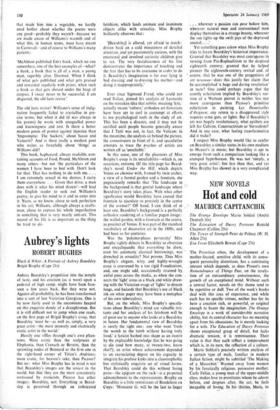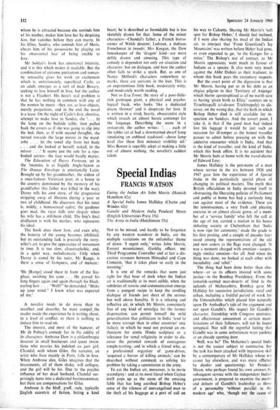NEW NOVELS
Hot and cold
4 MAURICE CAPITANCHIK The Orange Envelope Mario Soldati (Andre Deutsch 30s) The Education of Davey Porteous Ronald Chapman (Collins 25s) The Tower of Strength Peter de Polnay (W. H. Allen 25s) Eva Trout Elizabeth Bowen (Cape 25s) The Proustian ethos, the development of a mother-fixated, sensitive child, with its conse- quent personality distortions, has a continuing interest which depends, as does Proust's own Remembrance of Things Past, on the revela- tion of an extraordinary consciousness, the growth of an exceptional mind. Without such a central factor, novels on this theme tend to be repetitive or dull. Two of the week's books deal with this area of experience, and while each has its specific virtues, neither has for its hero a creation rich, or powerful, or original enough to haunt the imagination. The Orange Envelope is a work of considerable narrative ability, but its central character has no meaning apart from his obsessions; he is merely looking for a wife. The Education of Davey Porteous shows -exceptional grasp of detail, but lacks dramatic tension; it is reminiscence. Their value is that they each reflect a temperament which is, in its-turn, the reflection of a culture.
Mario Soldati's precisely written analysis of a certain type of male, familiar in modern Italian fiction, might be subtitled 'The Making of a Masochist.' Warned away from women by his fanatically religious, possessive mother, Carlo Felice, a young man of the upper-middle class, makes love to prostitutes whom he adores before, and despises after, the act; he feels incapable of loving. In his thirties, Meris, to whom he is attracted because she reminds him of his mother, makes him love her by despising him, but vanishes before they can marry. In his fifties, Sandra, who reminds him of Meris, cheats him of his possessions by playing on his obsessional fear of being unable to love.
Mr Soldati's book has emotional intensity, and it is this which makes it readable. But the combination of extreme puritanism and roman- tic sensuality gives his work an excitement which is, unfortunately, superficial. Carlo, as an adult, emerges as a sort of male Bovary, seeking to lose himself in love, but the author is not a Flaubert. His hero's real problem is that he has nothing in common with any of the women he meets—they are, as love objects, merely projections, and in the end the novel is a tease. On the night of Carlo's first, abortive, attempt to make love to Sandra, she . . lit the lamp on the bedside table, then pulled back the covers as if she was going to slip into the bed, then, as if with second thoughts, she turned towards the large mirror in the ward- robe . . . let the towel slip from her body . . . and she looked at herself, naked, in the mirror . . .' It seems just the role for a ripe- bodied actress—the face would hardly matter.
The Education of Davey Porteous, set in the 'twenties, is as frigidly Anglo-Saxon as The Orange Envelope is emotionally Latin. Brought up by his grandmother, the widow of a once-famous Victorian poet, in a house in the country dominated by the memory of his grandfather (his father was killed in the war), Davey tells his own story, of the progressive stripping away of illusions during a 'year or two of childhood. He discovers that his tutor is, mildly, a homosexual sadist; the gardener goes mad, the vicar falls into despair when his wife has a still-born child. The boy's final disillusion is with his mother, who represents his ideal.
The book does show how, and even why, the honesty of the young becomes inhibited, but its outstanding lack is precisely the story- teller's art, to give the appearance of movement in time. It is too slow, claustrophobic, and, in a quiet way, melodramatic. Only when Davey is caned by his tutor, Mr Range, is there a sense of Iivingness, and of menace: 'He [Range] stood there in front of the fire- place, swishing his cane . . . He passed his long fingers again and again through his black, curling hair . . . "Well?" he demanded. "Make up your mind." I knew what was expected of me.'
A novelist needs to do more than to recollect and describe, he must compel the reader inside the experience he is writing about, to a level of conflict, or there is nothing to induce him to read on.
The interest, and most of the humour, of Mr de Polnay's comedy lies in the oddity of its characters. Ambrose Dow is a philanthropic investor in small businesses and queer inven- tions who marries his indolent au pair girl, Chandal, with whom Giles, the narrator, an artist who lives mainly in Paris, falls in love. When Ambrose dies, Giles imagines that the investments, all of them shaky, will collapse, and the girl will be his. Due to the psychic influence of her dead husband, Chandal sur- prisingly turns into a dedicated businesswoman, but there are compensations for Giles.
Ambrose is the bluff, gruff, rude, typically ,English eccentric of fiction, hiding a kind heart; he is described as formidable but is too sketchily drawn for that. Some of the minor characters—Chandal's father, a French bistro- owner of Welsh descent; Ledreux, a dubious Frenchman in tweeds; Mrs Keegan, the Dow housekeeper of the 'dragon' kind—are more deftly drawn and amusing. This type of comedy is dependent not only on situation and character, but on dialogue, and here the author often fails to strike a spark. But, as one of Nancy Mitford's characters somewhere re- marks, there are currants in the bun. This is an unpretentious little book, moderately witty, and moderately worth reading.
Not so Eva Trout, the story of a poor-little- rich grotesque giant, a physical and psycho- logical freak, who looks 'like a dedicated discus thrower' and is desperate for love. It is written in a vivid, hearty, obscurantist style which reveals an almost heroic contempt for the language. Describing the scene in a restaurant, the author writes: . . each of the tables sat at had a downturned dwarf lamp simulating an oxblood toadstool—above lamp level (for these first minutes) visibility nil.' Miss Bowen is superbly adept at making a little out of almost nothing, the novelist's saddest talent.



































 Previous page
Previous page